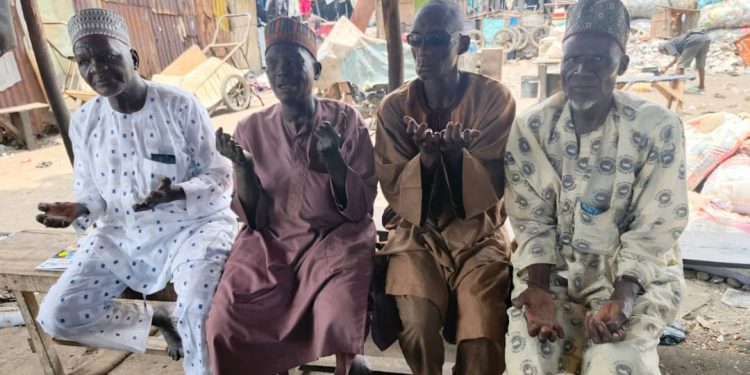The Alabarago Lepers Community in Ojo Local Government Area, Lagos State, might seem like nothing more than a desolate dump site. But within this overlooked settlement lie the stories of people fighting not just the physical scars of leprosy, but also the heavy burden of health struggles, societal stigma and neglect.
Alabarago is home to about 200 leprosy survivors who endure multi-faceted stigma and neglect, their children are hardly welcome in schools. They are unable to get stable work, and depend on begging to survive starvation. Their physical deformity has left them incapable of attaining normal work.
Leprosy is a chronic infectious disease caused by Mycobacterium leprae. The disease mainly affects the skin, the peripheral nerves, the mucosa of the upper respiratory tract, and the eyes. However, early detection and prompt treatment with multidrug therapy (MDT) can significantly reduce the burden of leprosy.
Thousands of people are been infected with leprosy in Nigeria. According to the Leprosy Mission in Nigeria, over 3,500 new cases are recorded annually, making Nigeria one of the few countries still grappling with ongoing transmission within communities. Despite being curable, the late detection and treatment of leprosy often result in severe disabilities, rendering those affected unable to work, forcing them into a life of begging, and making life unimaginably difficult for them.
Umar Abdulahi, a former teacher and long-time resident of Alabarago, who is also a leprosy survivor, expresses a life of isolation and despair. “The nerve damage from leprosy has deformed many of us,” he shares, “and with these deformities, finding work is impossible. Our only means of survival is begging.”
The physical health challenges are compounded by severe skin infections and chronic wounds that plague the survivors in the community. Many of these infections are directly related to the effects of leprosy, but they are made worse by poor living conditions and lack of proper medical care.
The impact of leprosy extends beyond physical health; it has deep psychological and social ramifications.
Dr. Samuel Ekene, a public health expert at the University of Lagos, emphasizes that treating leprosy requires more than just medication. “Leprosy is not merely a physical disease; but also a social and psychological one as well. The stigma associated with the disease is a major barrier to treatment, leading to isolation and worsening the mental health of those affected”.
This stigma often drives those with leprosy to self-isolation, exacerbating feelings of loneliness and hopelessness. Mrs. Ifeoma Ogu, a clinical psychologist, underscores the psychological toll this takes on individuals. “The constant rejection and discrimination can lead to severe depression and anxiety among people with leprosy. They begin to see themselves through the lens of society’s judgment, which can prevent them from seeking the help they desperately need”.
The mental health burden on people with leprosy is significant. Dr. Adebayo Akinola, a psychiatrist at Lagos State University Teaching Hospital (LASUTH), explains, “We often see cases of chronic depression, anxiety disorders, and even post-traumatic stress among those living with leprosy. The trauma of being ostracized is compounded by the physical pain and disability caused by the disease”.
Dr. Grace Adefemi, a Dermatologist of Lagos University Teaching Hospital (LUTH), noted the significance of early detection and treatment of leprosy. “Early diagnosis is key to preventing the severe deformities that lead to stigma,” she notes. “Unfortunately, due to the fear and misinformation surrounding leprosy, many patients delay seeking treatment until it’s too late, resulting in irreversible damage”.
The healthcare challenges, combined with psychological and social isolation, create a complex web of suffering that makes escaping the cycle of poverty and disease nearly impossible.
The story of persons with disability is not just one of physical disease but of a complex web of health, social, and psychological challenges. While leprosy is curable, the road to recovery is hindered by the deep-seated stigma that surrounds it. Addressing this requires a multifaceted approach, combining medical treatment with psychological support and social reintegration.
Dr. Ekene advocates for a community-centred approach to leprosy care. “We must integrate mental health services into the care for leprosy patients. Support groups, counselling, and psychiatric care should be as readily available as medical treatment. Only by addressing the mental health needs can we begin to break the cycle of stigma and isolation”.
People with disabilities, like Umar Abdulahi, are not just patients, they are individuals with dreams and aspirations, crushed under the weight of their circumstances. Their children, who should be in school, are instead forced to pick scraps to survive, their futures dimmed by the shadow of their parents’ affliction.
But with the right support, such as public education campaigns to dispel myths about leprosy, as well as policies that ensure these individuals have access to education, employment, and social services, those affected by leprosy can rebuild their lives.
The fight against leprosy is not just a fight against disease, but against the societal forces that perpetuate the suffering of those who have been cured yet remain scarred by stigma.
Leprosy survivors have been silenced for too long. It is time to listen, to act, and to ensure that they, and others like them, are not forgotten. In doing so, we take a critical step towards a future where leprosy is not just cured, but where its survivors can live with dignity and hope.
This story was produced by Oluchi Eze, MSc Student of Mass Communication, University of Lagos, following the training on Disability Reporting facilitated by Blessing Oladunjoye, Publisher of BONews Service.

